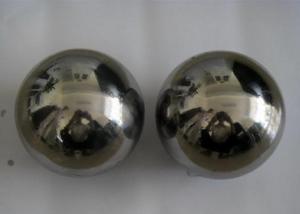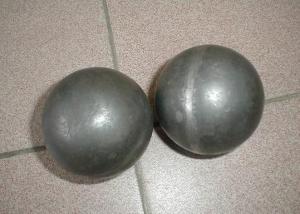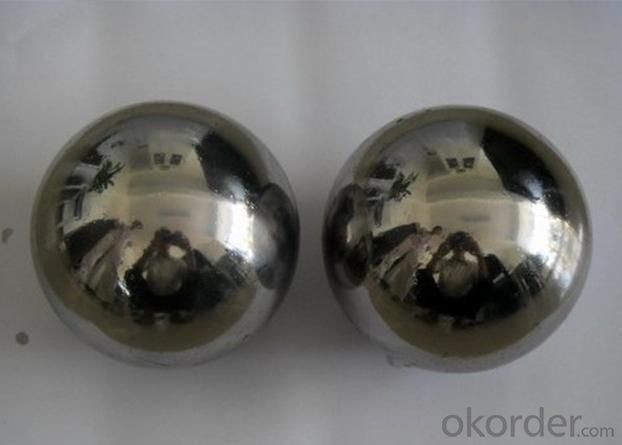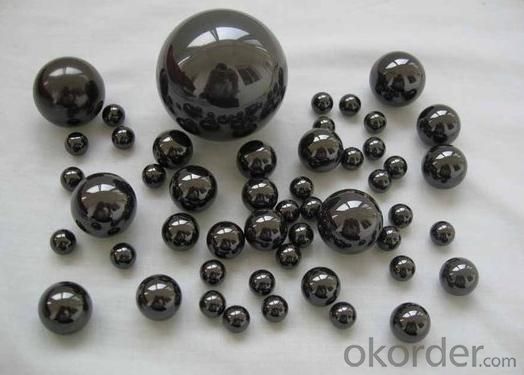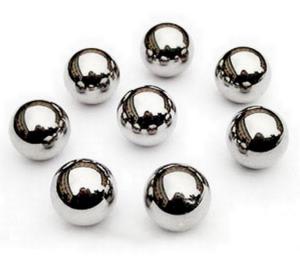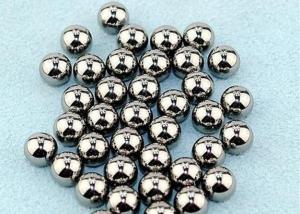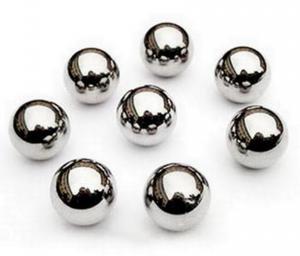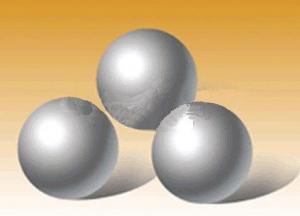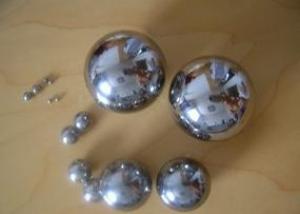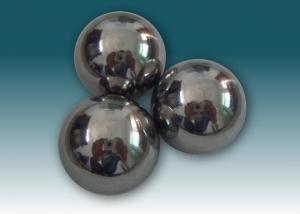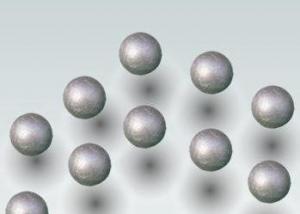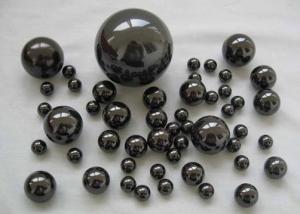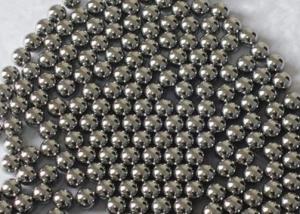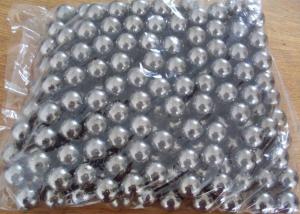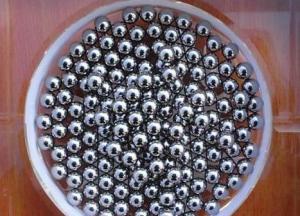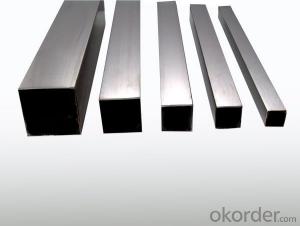304L Stainless Steel Ball
- Loading Port:
- China Main Port
- Payment Terms:
- TT or LC
- Min Order Qty:
- 5 Tons pc
- Supply Capability:
- 1000 Tons Per Month pc/month
OKorder Service Pledge
OKorder Financial Service
You Might Also Like
Stainless Steel Ball
MAIN PRODUCTS:
1. Material: AISI304, 316L, 420C, 430, 440C
2. Steel ball, with material AISI 1008-1086.
3. Chrome steel ball,with material: AISI52100
4. Flying saucer steel ball
5. Precision casting, including auto parts, machine parts, hardware handles, etc.
CHARACTER OF PRODUCTS:
1.The Grade of our products is from G10 to G1000
2.The dimension is from 0.5 mm to 25.4 mm.
3.The products from us are widely used in several industries, such as hardware, sliders, ball bearing lead screw, wheels, toys, bicycles, bearings, trust bearings pulleys, chemical industries, etc.
DETAIL SPECIFICATION:
|
Item |
SS304,316L,420C,440C Stainless steel ball |
|
Category |
Stainless Steel Ball |
|
Material |
AISI 420 430 440 SS304 316L |
|
Size |
0.5mm--25.4mm, 1/4",3/16",5/32",1/8",7/32",5/16",7/8",1" |
|
Grade |
G100-G3000 |
|
Hardness ( HRC) |
HRC58-65 |
|
Application |
Bicycle, bearing, pulley, slide, handcraft, shelf, luggage, hardware, grinding media |
|
Standard |
GB/T-308-2002, GB/T1148-93 |
|
Matched Standard |
DIN, JIS, ASME |
|
Certification |
ISO |
|
Packing |
Oily packing in pouch packing,plastic/tin box packing 1, 25kg/carton with steel pallet packing 2,25kg/carton without steel pallet packing 3,10kg/box then in wooden case packing 4,250kg/ steel drum packing or according to customers' requirement |
|
Place of original |
Shandong province, China |
|
Delivery |
Within 30 days or confirmed while placing order |
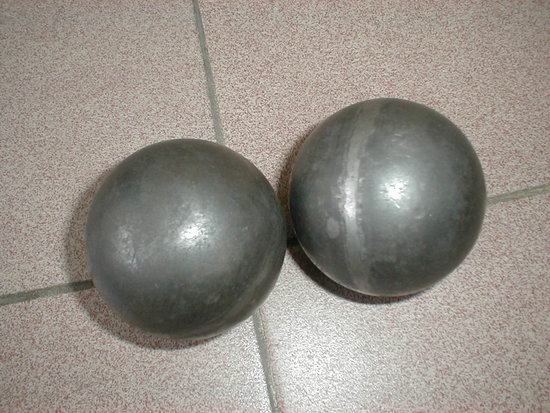
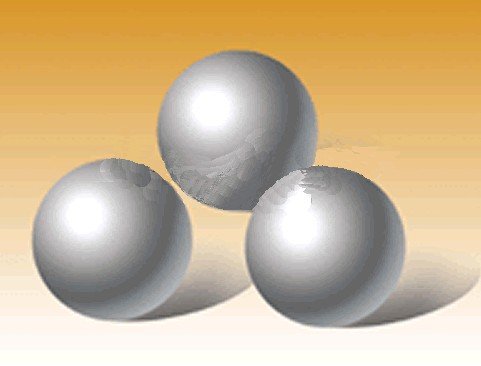
- Q: What is the density of stainless steel balls?
- Depending on the specific grade or alloy of stainless steel utilized, the density of stainless steel balls may vary. Nonetheless, the average density of stainless steel is approximately 7.9 grams per cubic centimeter.
- Q: Are stainless steel balls resistant to thermal expansion?
- Indeed, stainless steel balls exhibit resistance towards thermal expansion. Stainless steel, characterized by the inclusion of chromium, boasts exceptional resistance against corrosion and high temperatures. Consequently, stainless steel balls can endure thermal expansion with minimal alterations to their shape or size. Thermal expansion, which denotes a material's inclination to expand or contract in reaction to temperature shifts, is a phenomenon encountered by all materials to some extent. Nevertheless, stainless steel possesses a relatively low coefficient of thermal expansion in comparison to other metals. This attribute renders stainless steel balls an appropriate selection for endeavors necessitating dimensional stability amidst fluctuating temperatures.
- Q: Are stainless steel balls used in HVAC systems?
- Yes, stainless steel balls are commonly used in HVAC systems. These balls are often used in ball valves, which are essential components in HVAC systems for controlling the flow of fluids such as air, water, or refrigerants. Stainless steel balls are preferred in HVAC systems due to their corrosion resistance, durability, and ability to withstand high temperatures and pressures. Additionally, stainless steel balls offer excellent sealing properties, ensuring a tight closure and preventing leakage in the system. Overall, the use of stainless steel balls in HVAC systems helps to ensure optimal performance, efficiency, and longevity of the system.
- Q: Are stainless steel balls used in semiconductor manufacturing?
- Indeed, in the realm of semiconductor manufacturing, stainless steel balls find their purpose. These balls, commonly employed throughout multiple phases of the manufacturing process, encompass wafer cleaning, chemical etching, and polishing. The preference for stainless steel balls in semiconductor manufacturing arises from their remarkable resistance to corrosion, commendable mechanical attributes, and capability to endure elevated temperatures. Their application extends to equipment and processes that require utmost precision, cleanliness, and dependability. Furthermore, their non-magnetic nature plays a vital role in semiconductor manufacturing, preventing any disruption to delicate electronic components.
- Q: How are stainless steel balls used in the food industry?
- Stainless steel balls are commonly used in the food industry for various applications such as mixing, grinding, and homogenizing food products. They are often utilized in food processing equipment, including mills, blenders, and mixers, to assist in the efficient and uniform blending of ingredients. Stainless steel balls are preferred due to their corrosion resistance, durability, and ability to maintain hygiene standards, making them ideal for ensuring food safety and quality.
- Q: Can stainless steel balls be used in gyroscopes?
- Indeed, gyroscopes can utilize stainless steel balls. These devices serve the purpose of measuring or preserving orientation and angular velocity. Constructed with a spinning rotor affixed to a series of pivots, gyroscopes enable unrestricted rotation. Stainless steel balls are suitable as the rotor material in gyroscopes due to the robust and enduring nature of stainless steel, enabling it to withstand the substantial speeds and forces involved in gyroscopic motion. Furthermore, stainless steel possesses properties of minimal friction, facilitating seamless rotation and precise measurements. Consequently, stainless steel balls find widespread use in gyroscopes across a range of applications, including navigation systems, aerospace technology, and stabilization devices.
- Q: Are stainless steel balls suitable for ball bearings?
- Yes, stainless steel balls are suitable for ball bearings. Stainless steel is a popular material choice for ball bearings due to its many beneficial properties. Firstly, stainless steel is highly corrosion-resistant, which prevents rusting and extends the lifespan of the ball bearing. This is particularly important in applications where the bearing is exposed to moisture or harsh environments. Additionally, stainless steel has excellent mechanical properties, such as high hardness and strength. This allows the bearing to withstand heavy loads and high-speed rotations without deformation or failure. Stainless steel balls also offer good dimensional stability and low coefficient of friction, resulting in smooth and efficient operation of the bearing. Moreover, stainless steel balls are suitable for a wide range of temperatures, making them versatile for various industrial applications. They are commonly used in industries such as aerospace, automotive, medical, and food processing, where reliability and durability are crucial. In summary, stainless steel balls possess the necessary properties to be suitable for ball bearings. Their corrosion resistance, mechanical strength, dimensional stability, and temperature tolerance make them an excellent choice for ensuring smooth and reliable operation in various applications.
- Q: Are stainless steel balls resistant to solvents?
- Yes, stainless steel balls are generally resistant to solvents. Stainless steel is known for its excellent corrosion resistance, which makes it highly resistant to various chemicals and solvents. This resistance is primarily due to the high levels of chromium and nickel present in stainless steel, which form a protective layer on the surface of the material, preventing it from reacting with solvents. However, it is important to note that the resistance of stainless steel balls to solvents can vary depending on the specific type of solvent and the concentration used. Therefore, it is always recommended to consider the specific solvents and their compatibility with stainless steel before using stainless steel balls in any application involving solvents.
- Q: Are stainless steel balls resistant to impact or shock?
- Yes, stainless steel balls are generally resistant to impact and shock. Stainless steel is known for its high strength and durability, making it an ideal material for applications that require resistance to impact or shock. These balls are commonly used in various industries, including aerospace, automotive, and industrial machinery, where they are subjected to high forces and impacts. The hardness and toughness of stainless steel allow it to withstand such impacts without deformation or breakage. Additionally, stainless steel balls have excellent corrosion resistance properties, further enhancing their ability to withstand impacts over time. However, it is essential to note that the specific resistance to impact or shock may vary depending on the grade and composition of the stainless steel used. Therefore, it is crucial to select the appropriate stainless steel grade based on the specific application and requirements.
- Q: Are stainless steel balls used in grinding media?
- Yes, stainless steel balls are commonly used as grinding media in various industries. Due to their high resistance to corrosion, stainless steel balls can effectively grind materials without contaminating them. They are often used in applications such as grinding ores, minerals, and other abrasive substances. Additionally, stainless steel balls are known for their durability and strength, making them suitable for heavy-duty grinding processes. Overall, stainless steel balls are a popular choice for grinding media due to their superior performance and resistance to wear and tear.
Send your message to us
304L Stainless Steel Ball
- Loading Port:
- China Main Port
- Payment Terms:
- TT or LC
- Min Order Qty:
- 5 Tons pc
- Supply Capability:
- 1000 Tons Per Month pc/month
OKorder Service Pledge
OKorder Financial Service
Similar products
Hot Searches
Related keywords
